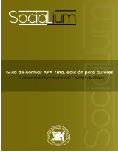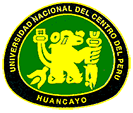Internal returnees for covid-19: a look from inequality and informality
DOI:
https://doi.org/10.26490/uncp.sl.2021.5.1.738Keywords:
Migration by return, returnees, inequality, informalityAbstract
The study's objectives were: 1) Identify who were the returnees, 2) Analyze the internal return factors and 3) Explain both the dynamics and types of return. For this, the qualitative research method was used, in its narrative design modality. The main information gathering technique was documentary observation (newspapers, magazines, webinars, Internet interviews, among others). It is concluded that, although there were conjunctural elements that favored the phenomenon of return such as quarantine, social isolation, social distancing and the state of emergency, there were two structural triggers: inequality and informality in the country. Likewise, the displacement of returnees due to covid-19, a form of forced migration, would take two main trends: one, it would be return migration when the actors make the final decision to stay in their places of origin and two, of re-migration if they decide return again to their migrant destinations. This depends on the duration of the pandemic, the isolation or social confinement, the state of emergency, but above all on the outcome of the ongoing health, economic and social crisis.
References
Banco Mundial (2020). Crisis por el coronavirus aumentó las desigualdades en el Perú. https://www.bancomundial.org/es/news/press-release/2020/09/08/crisis-por-el-coronavirus-aumento-las-desigualdades-en-el-peru.
Castillo, J. (1997). Teorías de la migración de retorno. En: A. Izquierdo y G. Álvarez (coord.) Políticas de retorno de emigrantes. Universidades Coruña. Pp. 29-44.
Coral, I. (2020). Desplazamiento interno por impacto del coronavirus en el Perú. http://www.otramirada.pe/desplazamiento-interno-por-impacto-del-coronavirus-en-el-per%C3%BA.
Defensoría del Pueblo (2020a). Prevención y gestión de conflictos sociales en el contexto de la pandemia por el Covid-19. Serie Informes Especiales N° 026-2020-DP. Defensoría del Pueblo.
Defensoría del Pueblo (2020b). Migración interna y varados durante la pandemia. acciones desarrolladas por la Defensoría del Pueblo. Serie Informes Especiales Nº 23-2020-DP. Defensoría del Pueblo.
Dubet, F. (2015). ¿Por qué preferimos la desigualdad? (aunque digamos lo contrario). 1ª ed. Siglo Veintiuno Editores.
Flick, U. (2015). El diseño de la investigación cualitativa. Ediciones Morata.
Hernández, R. y Mendoza, C. (2018). Metodología de la investigación. Las rutas cuantitativa, cualitativa y mixta. McGraw-Hill Interamericana Editores.
INEI (2020). Estado de la población peruana 2020. Lima: INEI-UNFPA.
Kanbur, R. (2010). Avoiding Informality Traps. http://www.wiego.org/sites/default/files/publications/files/Kanbur_Avoiding.Informality.Traps_.pdf.
López, M. (2009). El concepto de anomia de Durkheim y las aportaciones teóricas posteriores. Iberóforum. Revista de Ciencias Sociales de la Universidad Iberoamericana, 8, 130-147.
Mendoza, A. (2017). Brechas latentes índice de avance contra la desigualdad - Perú 2016. OXFAM.
Mendoza, A. (2019). Brechas latentes índice de avance contra la desigualdad - Perú 2017-2018. OXFAM.
Muñoz, F. (2020). Webinar: Movilidad interna en tiempos de Covid-19. IDEHPUCP PUCP, 8 mayo. https://www.youtube.com/watch?v=vPjsaO3_j3w.
OXFAM (2015). Para no retroceder. Realidad y riesgo de la desigualdad en el Perú. Documento de trabajo para Perú Nº 1. OXFAM.
Pereda, D. (28 de abril de 2020). La mitad teme más al hambre que al coronavirus. Diario La República. https://larepublica.pe/sociedad/2020/04/28/coronavirus-en-peru-encuesta-nacional-del-iep-revela-que-la-mitad-de-los-peruanos-teme-mas-al-hambre-que-al-covid-19/
PERUCAMARAS (2020). El 72,7% de trabajadores en el país son informales. PERUCAMARAS, edición virtual centro, número 339, 12.
Rosel, O. (2020). Estamos ante un desborde popular inverso. Una entrevista con Mario Zolezzi. 24 de abril. http://www.desco.org.pe/estamos-ante-un-desborde-popular-inverso-una-entrevista-con-mario-zolezzi.
Salazar, J. y Chacaltana, J. (2018). La informalidad en América Latina y el Caribe: ¿Por qué persiste y cómo superarla? En: J.
Salazar y J. Chacaltana (Editores): Políticas de Formalización en América Latina: Avances y Desafíos. OIT. Pp. 13-48.
Tilly, Ch. (2000). La desigualdad persistente. Ediciones Manantial.
Zapata R. et al (2020). La dura travesía de los más pobres: pandemia y desempleo expulsan a miles de migrantes. 25 de abril. https://ojo-publico.com/1786/desplazados-por-la-pandemia-la-travesia-de-los-mas-pobres.
Downloads
Published
Issue
Section
License
Copyright (c) 2021 Teódulo Gerardo Lázaro Aquino

This work is licensed under a Creative Commons Attribution 4.0 International License.








.jpg)















